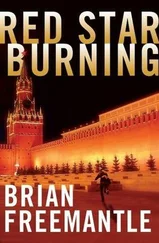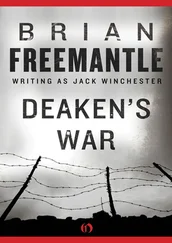Brian Freemantle - Betrayals
Здесь есть возможность читать онлайн «Brian Freemantle - Betrayals» весь текст электронной книги совершенно бесплатно (целиком полную версию без сокращений). В некоторых случаях можно слушать аудио, скачать через торрент в формате fb2 и присутствует краткое содержание. Жанр: Триллер, на английском языке. Описание произведения, (предисловие) а так же отзывы посетителей доступны на портале библиотеки ЛибКат.
- Название:Betrayals
- Автор:
- Жанр:
- Год:неизвестен
- ISBN:нет данных
- Рейтинг книги:5 / 5. Голосов: 1
-
Избранное:Добавить в избранное
- Отзывы:
-
Ваша оценка:
- 100
- 1
- 2
- 3
- 4
- 5
Betrayals: краткое содержание, описание и аннотация
Предлагаем к чтению аннотацию, описание, краткое содержание или предисловие (зависит от того, что написал сам автор книги «Betrayals»). Если вы не нашли необходимую информацию о книге — напишите в комментариях, мы постараемся отыскать её.
Betrayals — читать онлайн бесплатно полную книгу (весь текст) целиком
Ниже представлен текст книги, разбитый по страницам. Система сохранения места последней прочитанной страницы, позволяет с удобством читать онлайн бесплатно книгу «Betrayals», без необходимости каждый раз заново искать на чём Вы остановились. Поставьте закладку, и сможете в любой момент перейти на страницу, на которой закончили чтение.
Интервал:
Закладка:
“Which brings us back to you, Ms. Stone,” said Willsher.
Janet stirred, gratefully. She had to get out, she thought. The constricted feeling had gone beyond a mental impression. She felt the room closing in upon her, walls and ceiling pressing around her, squeezing her breathless. She said: “It’s the same location. John hasn’t been moved.”
“Son of a bitch!” said the soldier, driving a fist into the palm of his other hand in satisfied excitement. “Just what I wanted to hear.”
“We can go then,” said Willsher. It was not really a question, but the soldier responded.
“Two ackemma tomorrow,” he said.
She had it, Janet accepted. She had the precise information required by one man she loved to free the other man she loved. Jesus! she thought, despairingly.
Knox offered to accompany her back to the hotel but Janet said she wanted to be alone and the CIA officer withdrew at once, imagining her need for solitude to be caused by the nearness of the operation, with no way of knowing the proper reason. Or the seed of an idea germinating in her mind.
She had the limousine drop her by the old city, and wended her way completely across the Greek-held section to emerge by the Famagusta Gate. Baxeter was waiting as he’d promised he would be, parked in Themis Street. The Volkswagen was dirty, as it had been the first time she’d ridden in it: why did such inconsequential things register?
He drove off as soon as she got in. “You were much longer than I expected,” he said.
Janet didn’t bother with an explanation. The determination that had started to grow on her way from the embassy was hardening within her. She said: “Are you to be part of the commando assault?”
Baxeter glanced quickly across at her and then back at the road. “Yes,” he said. “I’m trained.”
“I want to come,” announced Janet.
“What!” Baxeter had taken Kennedy Avenue, driving without any particular intention towards Famagusta. He jerked the car hurriedly into the side of the road, cranking on the handbrake.
“I want to come,” repeated Janet.
“That’s absurd! Utterly absurd! Laughable!”
“Not to me,” she said. “Nothing seems laughable to me: absurd a lot of the time but never laughable.”
“Why!”
“I’ve just had a long lecture about John’s needs,” said Janet. “It was very convincing. I think it’s about time I started doing the right thing and considered John’s needs, don’t you? John’s needs rather than my needs or your needs.”
“I promise you he will be gotten out,” said Baxeter.
“I know the time,” said Janet. “The precise hour and the precise day. Unless you agree to my coming I don’t intend to tell you.”
“Darling, this is ridiculous. How can you expect us to take you? You’re an…”
“… Amateur,” finished Janet, for him. “I won’t get in the way. I’ll do exactly what I am told, when I am told. I must be there, when John is freed. He’s got to see my face.”
“No.”
“I mean what I say.”
“It’s not my decision.”
“Then I’ll rely on the Americans,” said Janet. She stopped, breathing in courage for the final, determined ultimatum. “And I’ll tell them what you intended to do: how you intended to use their assault as a diversion. I know what that will mean: for me personally. What they’ll learn. I don’t care, if it’ll help what they’re trying to do. They might need to alter their planning. It’s got to work: that’s all that matters. That John is freed.”
30
I t was a fishing boat again: in the darkness it seemed to have the same mid-section construction and be about the same size. Janet waited, expectantly, for the revulsion, but nothing came. This boat was cleaner, although there was still the stink of fish. The muttered challenge came as soon as Baxeter hauled her inboard from the rowboat which had ferried them from the bay near Cape Pyla. Janet guessed the mutter to be Hebrew, a language she did not understand. Baxeter’s retort was brief but sharp, in the tone of a superior to subordinates, and the challenge stopped abruptly.
“There’s shelter in the wheelhouse,” suggested Baxeter.
“No!” Janet said at once, remembering the last time. Baxeter had retreated from her, in attitude and mind: he had agreed that she should come as soon as she threatened going to the Americans, but he clearly begrudged the concession.
“It won’t be long: a mile or two,” he said.
“What then?”
“Transfer to a proper patrol boat.”
Until now Janet had not considered how they were going to reach the Lebanese mainland: it was going to be a great deal different than before. Trying to rebuild bridges between them, she said: “Now that I’ve explained what Robards told me, don’t you understand?”
“No,” rejected Baxeter. He was actually standing away from her, his gaze towards the open sea where he expected the Israeli patrol boats to be laying off.
Was it his reluctance to accept her presence? wondered Janet. Or was this a side of Baxeter she had not experienced before, the man’s ability to compartment himself, concentrating upon something or someone absolutely essential at that particular and absolute moment and able to relegate everything or everyone else of subsidiary importance? “It’s necessary that I come,” she insisted.
“You made that clear.”
There was a call, a single word in Hebrew, from the wheelhouse and Baxeter slightly changed the direction in which he was looking. Janet followed his gaze, hearing the patrol boat before she actually detected it: a throaty, heavy, bubbled sound of very powerful engines throttled back to minimal tick-over, practically a protest at the waste of such power.
The seamanship was superb. Without any obvious signals the captain of the fishing boat brought his vessel softly against the side of the matchingly maneuvered patrol boat and the two sides kissed the hanging fenders with the merest jolt.
“Step across: follow me,” ordered Baxeter.
Janet did as she was told without any stumble or uncertainty and was glad, anxious not to indicate this early that she might become an encumbrance. Despite the darkness she was immediately noticed. There was an eruption of babbled Hebrew against which Baxeter argued, and then started to shout: unseen, black-garbed figures whose faces and heads also seemed blackened shouted back, milling in front of them and gesticulating wildly. Some of the shouts were to the fishing boat that was easing away, and it at once reversed its engines. Janet guessed the instruction had been to return to take her off. The argument became a violent, yelling row, with Baxeter standing in front of her in the manner of a protector. Gradually Janet recognized a sameness in the gestures, and as she did Baxeter said to her over his shoulder: “They are insisting I talk to Tel Aviv.”
He reached protectively behind him and seized her arm to guide her towards the darker superstructure.
Once she entered the radio shack Janet understood where she was-on a very special custom-built vessel created for a very special function. Everyone wore black, one-piece boiler suits-even the zips were black-without any insignia of rank, fitted with push-back hoods that could be pulled up entirely to cover the head. There was no white light, just red, but despite the dullness Janet could make out that all the internal fittings were black, not a single item risking the reflection of any sort of light and that beyond, on the open deck, all the metal was blackened too, covered by some plastic or bitumen coating.
A fair-haired man insisted upon using the radio first, yelling into the mouthpiece as loudly as he had upon the deck, and then Baxeter snatched it away from him but spoke in more controlled tones than the other man, forceful reason against inconsiderate anger. From the transmitter came a flurry of questions and although she could not understand the language Janet was able to discern three different voices and guessed the concern would be as great in Israel as it appeared aboard this bizarre boat. First Baxeter responded, then the fair-haired man, then Baxeter again: the transmission ended with the fair-haired commando throwing down a pencil in disgust and stumping past her. Janet was near the doorway and he actually attempted to collide with her but at the last minute she went further sideways into the shack and he missed. Janet, who was pleased, hoped Baxeter had seen.
Читать дальшеИнтервал:
Закладка:
Похожие книги на «Betrayals»
Представляем Вашему вниманию похожие книги на «Betrayals» списком для выбора. Мы отобрали схожую по названию и смыслу литературу в надежде предоставить читателям больше вариантов отыскать новые, интересные, ещё непрочитанные произведения.
Обсуждение, отзывы о книге «Betrayals» и просто собственные мнения читателей. Оставьте ваши комментарии, напишите, что Вы думаете о произведении, его смысле или главных героях. Укажите что конкретно понравилось, а что нет, и почему Вы так считаете.












